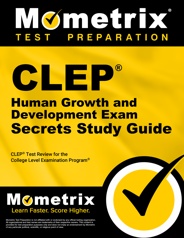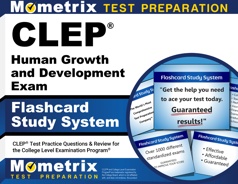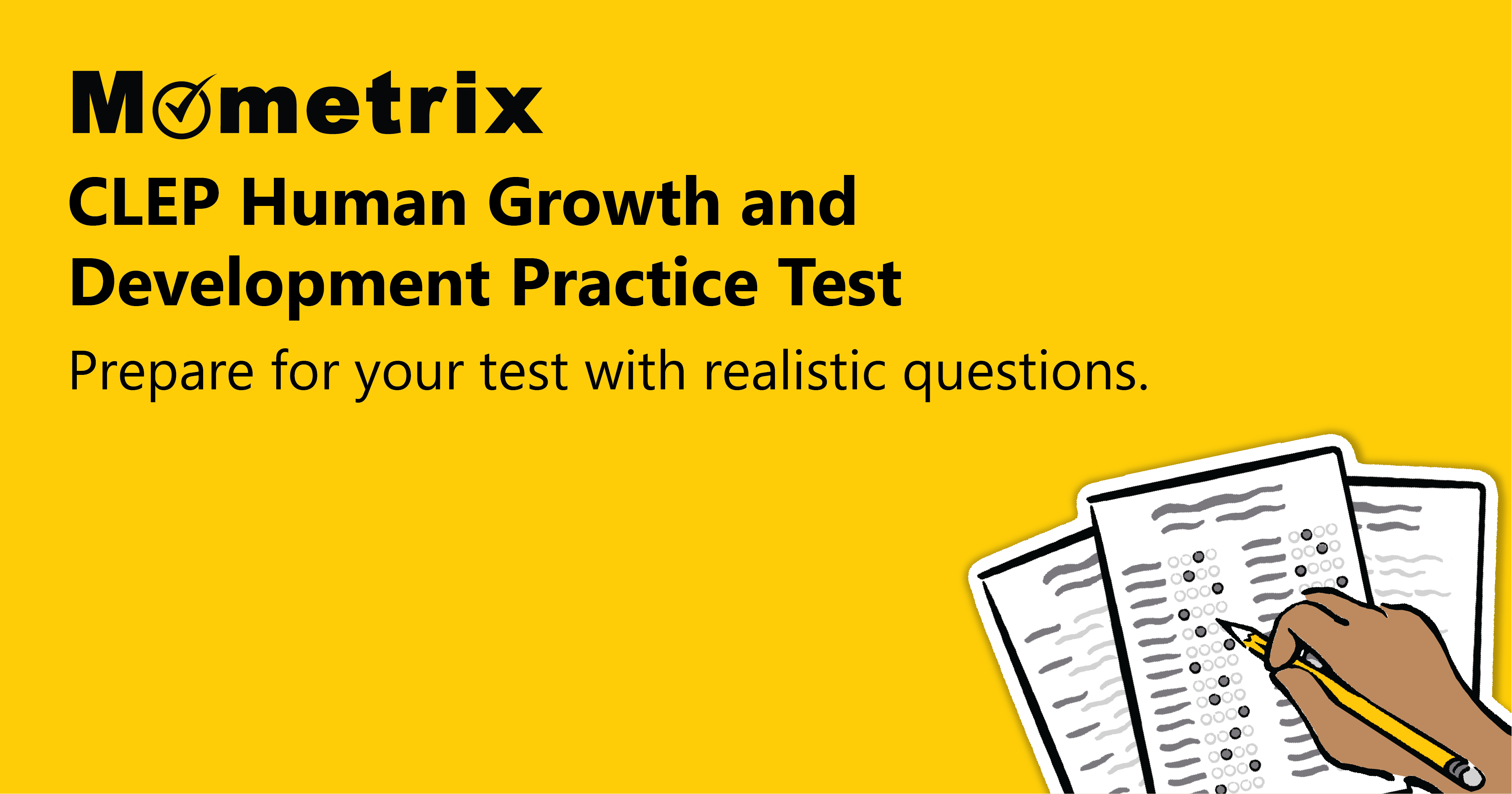The College Board administers the College-Level Examination Program® (CLEP®), which offers affordable exams that help students receive college credits. This article covers the CLEP Human Growth and Development exam, which covers developmental psychology and human development topics.
Click “Start Test” above to take a free CLEP Human Growth and Development practice test!
What is the CLEP Human Growth and Development Test?
CLEP tests are taken by students every year to earn college credits for the things they already know. If you have learned a substantial amount of information about a particular topic through on-the-job training, previous studies, or simple life experience, you can take this one exam and receive college credit as if you took the one-semester course!
By taking and passing the CLEP Human Growth and Development test, you can skip certain psychology and/or human development classes at college. This will potentially:
- Allow you to earn multiple college credits
- Save you money because the test is cheaper than a semester at college
- Allow you to graduate on time or possibly to graduate ahead of schedule
- Add flexibility to your degree program
You should check with your college before taking this exam to make sure they will accept your CLEP scores.
Exam Eligibility
The CLEP Human Growth and Development exam is available for anyone to take whenever they want! There are no age restrictions or educational requirements.
Here are some examples of who takes the CLEP Human Growth and Development exam:
- College students
- High school students who are preparing to graduate
- Homeschool students
- Adults who are returning to school
- Professionals who want to use the exam results to help advance their careers
- Applicants to master’s degree programs that still have undergraduate prerequisites they need to fulfill
CLEP Human Growth and Development Test Outline
The test contains 90 multiple-choice questions and has a 90-minute time limit.
You will be tested on your knowledge of 12 topic categories.
Theoretical Perspectives (10%)
The questions in this section assess your knowledge of the following theoretical perspectives:
- Evolutionary
- Biological
- Learning
- Social cognitive
- Cognitive developmental
- Sociocultural
- Ecological
- Psychodynamic
Research Strategies and Methodology (6%)
The questions in this section assess your knowledge of the following strategies and methodologies:
- Longitudinal
- Correlational
- Cross sequential
- Experimental
- Case study
- Observational
- Cross sectional
Biological Development Throughout the Life Span (12%)
The questions in this section assess your knowledge of the following strategies and methodologies:
- Nervous system development
- Genetic disorders
- Physical growth and maturation
- Heredity, genetics, and genetic testing
- Hormonal influences
- Influences of drugs
- Motor development
- Brain development
- Prenatal influences
- Sexual maturation
- Teratogens
- Nutritional influences
- Perinatal influences
Perceptual Development Throughout the Life Span (6%)
The questions in this section assess your knowledge of the following topics:
- Sensory deprivation
- Habituation
- Sensory acuity
- Sensitive periods
- Sensorimotor activities
Cognitive Development Throughout the Life Span (12%)
The questions in this section assess your knowledge of the following topics:
- Play
- Attention
- Environmental influences
- Expertise
- Lev Vygotsky’s sociocultural theory
- Information processing
- Memory
- Jean Piaget’s cognitive development theory
- Problem-solving and planning
- Thinking
- Wisdom
- Executive function
Language Development (8%)
The questions in this section assess your knowledge of the following aspects of language development:
- Vocalization and sound
- Bilingualism
- Pragmatics
- Development of syntax
- Language and thought
- Semantic development
- Environmental, cultural, and genetic influences
Intelligence Throughout the Life Span (6%)
The questions in this section assess your knowledge of the following topics:
- Developmental stability and change
- Giftedness
- Intelligence tests
- Reaction range
- Heredity and environment
- Concepts of intelligence and creativity
Social Development Throughout the Life Span (12%)
The questions in this section assess your knowledge of the following topics:
- Attachment
- Risk and resilience
- Gender
- Interpersonal relationships
- Moral development
- Prosocial behavior
- Self
- Aggression
- Social cognition
- Wellness
- Social learning and modeling
Family, Home, and Society Throughout the Life Span (8%)
The questions in this section assess your knowledge of the following topics:
- Abuse and neglect
- Social and class influences
- Urie Bronfenbrenner
- Death and dying
- Family structures
- Multicultural perspectives
- Family relationships
- Parenting styles
- Media and technology
Personality and Emotion (8%)
The questions in this section assess your knowledge of the following topics:
- Attribution styles
- Sigmund Freud
- Emotional expression and regulation
- Emotional intelligence
- Erik Erikson
- Stability and change
- Psychosocial theory
- Temperament
- Development of emotions
Schooling, Work, and Interventions (6%)
The questions in this section assess your knowledge of the following topics:
- Retirement
- Applications of developmental principles
- Preschool care, day care, and elder care
- Intervention programs and services
- Learning styles
- Operant conditioning
- Occupational development
- Facilitation of role transitions
Developmental Psychopathology (6%)
The questions in this section assess your knowledge of the following topics:
- Antisocial behavior
- Trauma-based syndromes
- Chronic illnesses and physical disabilities
- Anxiety and mood disorders
- Attention-deficit/hyperactivity disorder
- Autism spectrum disorders
- Cognitive disorders, including dementia
- Learning disabilities
- Asocial behavior, fears, phobias, and obsessions
- Intellectual disability
Check Out Mometrix's CLEP Human Growth and Development Study Guide
Get practice questions, video tutorials, and detailed study lessons
Get Your Study Guide
Exam Registration
You can register for the exam online via the College Board website. The CLEP Human Growth and Development exam is administered throughout the year on a very flexible schedule.
During the registration process, you will need to pay the $97 exam fee. You will also choose whether to take the exam at a testing center or remotely. If you are taking the exam in-person, you must ensure that you print out your examination ticket once you have completed the registration process.
Test Day
In-person Testing
On the day of the test, you should arrive at the testing center 30 minutes early. When you arrive, you will be asked to provide a form of valid, government-issued photo ID, as well as your printed registration ticket.
Once you are checked in, you will be asked to leave all personal items in a provided locker. This includes your cell phone, keys, wallet, notes, bags, and food items.
Once your items have been stored, you will be led to the testing area and be given some instructions on the testing process before your test begins.
Remote Testing
On the day of the test, you should log in to your CLEP account about 30 minutes before the scheduled exam time. Once you have logged in, you will need to download and install the Proctortrack desktop application.
Within the Proctortrack app, you will be asked to verify your identity by scanning your photo ID and your face using the webcam. You will also be instructed to use your webcam to scan your testing room.
Once the verification process is complete, you will need to open the ETS Online Test application. The proctor will then be able to get you set up and begin the exam.
How the Test is Scored
The CLEP Human Growth and Development test is scored so that one point is awarded for each correct answer, and you will not have points taken away for any incorrect answers. You will also not have points taken away if you skip a question altogether.
The number of correct answers you have will be your raw score. The raw score will be converted into a scaled score, which is typically in numeric form ranging from 20 to about 80.
Your unofficial score report will be available on your screen as soon as you finish the exam, and an official report will be made available the next day when you log in to your CLEP account.
Check Out Mometrix's CLEP Human Growth and Development Flashcards
Get complex subjects broken down into easily understandable concepts
Get Your Flashcards
FAQs
Q
How many questions are on the CLEP Human Growth and Development test?
A
There are 90 multiple-choice questions on the test.
Q
How long is the CLEP Human Growth and Development test?
A
The time limit for the test is 90 minutes (1.5 hours).
Q
What is the passing score for the CLEP Human Growth and Development test?
A
There is no set passing score for this exam. Every college has its own scoring standards.
Q
How much does the CLEP Human Growth and Development test cost?
A
The testing fee is $97.
CLEP® and College-Level Examination Program® are trademarks registered by the College Board, which is not affiliated with, and does not endorse, this page.



